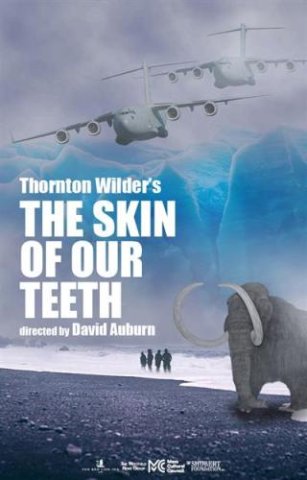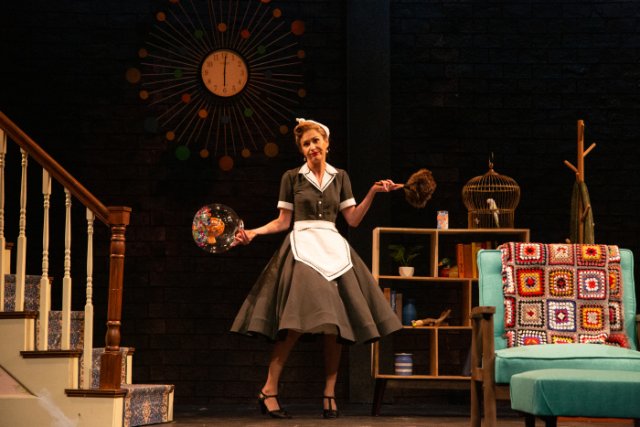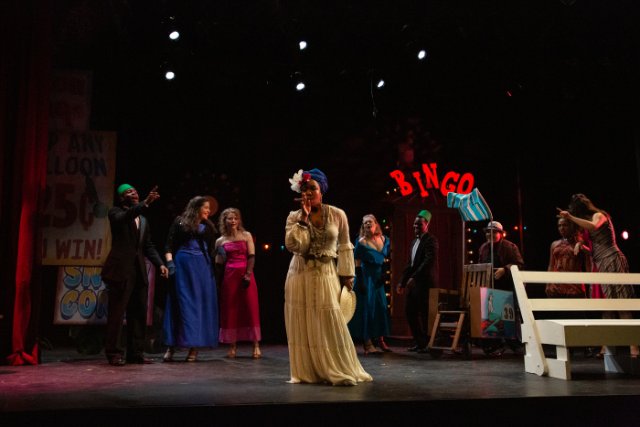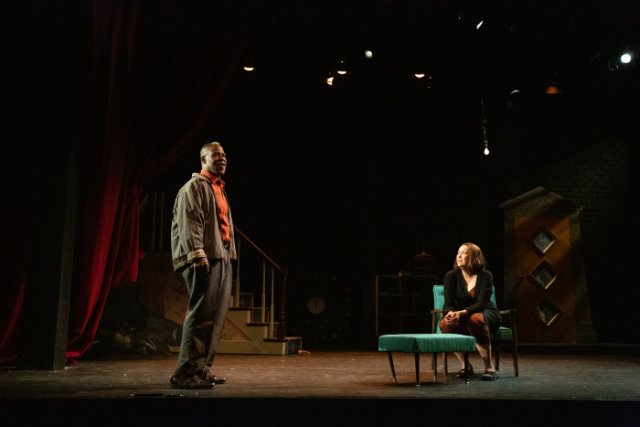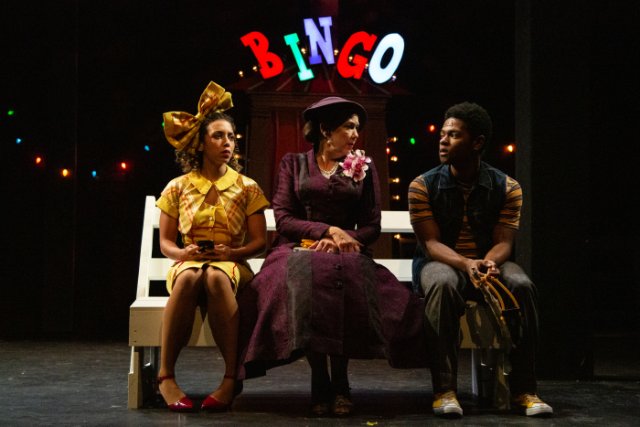The Skin of Our Teeth
Last Call for Humanity at Berkshire Theatre Group
By: Charles Giuliano - Jul 18, 2019
The Skin of Our Teeth
By Thornton Wilder
Director: David Auburn
Cast: Lauren Baez (Muse, Conveneer, Chair Pusher, Usher Bailey) Lynnette R. Freeman (Homer, Fortune Teller, Ivy) Marcus Gladney Jr. (Henry) Harriet Harris (Mrs. Antrobus) Danny Johnson (Mr. Antrobus) Ralph Petillo (Moses, Bingo Caller, Mr. Tremayne) Claire Saunders (Gladys) Marjie Shrimpton (Muse, Telegraph Boy, Hester) Matt Sullivan (Stage Manager, Broadcast Official) Ariana Venturi (Sabina) Kennedy Haygood, Isabel Jordan, Hanna Koczela, Alex O’Shea, Tony Reimonenq, Julian Tushabe (Acting Interns) Scenic Designer: Bill Clarke; Costume Designer: Hunter Kazorowski; Lighting Designer: Daniel J. Kotlowitz; Resident Composer, Sound Designer: Scott Killian; Wig, Hair and Makeup Designer: J. Jared Janas; Movement Director: Isadora Wolfe
Running time: two hours, forty five minutes, two intermissions
Berkshire Theatre Group
Fitzpatrick Main Stage, Stockbridge, MA
July 11 to August 3
By the end of the first of three acts, which ran from 7 PM to 10 PM, we braced for a long evening. There was a chaotic mess of characters, mumbo jumbo set, and utter mishegoss in Thornton Wilder’s 1942, Pulitzer Prize winning play “The Skin of Our Teeth.” As directed by David Auburn for Berkshire Theatre Group "Skim" compares to Wilder’s more iconic, other Pulitzer winner “Our Town” as theatre of the absurd on acid.
What’s intriguing it that there is indeed yin and yang to the two plays that reveal the Jekyl and Hyde polarities of the playwright’s intriguing but schizophrenic persona.
“Our Town” is a homily of Americana and normalcy while “The Skin of Our Teeth” is a leap off the cliff into a dauntingly horrific, darkly comedic apocalyptic prognosis of the end of civilization.
To make the point Wilder trots out a cast that includes Moses, Homer, Spinoza, Aristotle, Adam and Eve, Cain and Able, Noah and his ark, and Berkshire Medical Center. The last a flourish here and there to contemporize and localize the production by the director Auburn.
If this sounds confusing, which it is, consider the moment. It was written on the cusp of Americ’s entry into World War II. The trope of this production is that the doom and gloom zeitgeist of that era too precisely matches our current crisis. The chaos on stage convey many themes and images that whack us upside the face. From then to now what goes around comes around.
With time to adjust by the end of the evening there was much to like about this production. There were fine performances, defining moments and surreal overviews of the horrific underbelly of humanity.
The defining character of the play, in an utterly crisp, delightful and insightful performance was Ariana Venturi. She names and defines the play by stating in the first act that Americans had survived The Great Depression “By the skin of our teeth.” That would have resonated with the audience. It stoked a nation's malaise at jumping from the frying pan of economic hard times into the conflagration of global war.
As Sabina, the maid to George Antrobus (Danny Johnson) and Mrs. Antrobus (Harriet Harris), Venturi hilariously breaks the wall and talks to the audience. One of her first misgivings is about having to do the play again until 10 PM. Later, when characters don't show up there is a "rehearsal" with extras. Wilder constantly undermines his play with comic impact.
She is fussing about preparing for the arrival of Mr. Antrobus. That entails tending to the hearth in a small home bracing from the Ice Age. It seems that the couple have been married for 5,000 years. On a bitterly cold night the lady of the house lets in their pet dinosaur and wooly mammoth. That’s hilarious as the legs of the towering dino clomp on stage. Then against the objections of Mr. Antrobus a gaggle of historical figures come in from the cold. A huge platter of sandwiches is passed around.
After the cockamamie first act I wasn’t looking forward to the second. There was, however, a less chaotic shift to Atlantic City. There George has become President and is about to address a merry gathering of conventioneers. The huge cast is fleshed out with BTG students and interns.
It seems that George, now philandering after 5000 years of marriage, has crowned Venturi as a beauty queen. She talked it over with a fortune teller with a Rasta accent (Lauren Baez). The "Queen" wants to know her prospects with George. He is all too willing to bail. After 5000 years his wife has a few words to say. Humorously, the always brilliant and witty Harris pulls out a few notes. Index cards have been taped together and unfold as a speech that could go on, and on, and on.
The fun is seeing Venturi slither about in a colorful showgirl costume making the moves on George. They have a scene together which she refuses to act out. Instead she informs the audience what it’s about. Johnson seems confused and forgets his lines. Here Wilder gets rather edgy. To what extent was Wilder influenced by European avant-garde theatre?
Then shit happens. It seems a terrible storm is brewing. The showgirl says not to worry she has seen lots of storms ravish Atlantic City. But it morphs into a riff about Noah. There is an ark tied to the pier which is breaking up. He reverts back to getting his family on board but the problem son Henry/ Cain (Marcus Gladney, Jr.) has gone missing. There is also a daughter Gladys (Claire Saunders) now with child.
Two by two George is tasked with getting animals on board. Elephants, kangaroos and tigers paraded past us down the aisle. The revelers, casino sinners we assume, are likely lost. There is a light system to indicate threat levels. It goes code red which indicates the end of the world.
In the final act after seven years the war is over. We are back at the bombed out New Jersey home of the Antrobus family. Sabina is in tatters having survived in a bunker under the house. She and Mrs. Antrobus await the return of men from war. Henry, in paramilitary garb with a red beret, has become a stone cold killer and fascist general. He and George have been on opposite sides. Henry in an Oedipal riff wants to kill his father.
Wilder laces through the play so many Biblical, mythological, historical and philosophical references that you need Wikipedia to make sense of it. Father and son are reconciled and the playwright offers glimmers of a possible future. In hindsight the outcome of a then very real war was pure speculation.
Perhaps that’s why, yet again, Sabina steps out of character and appears alone on stage. She tells us that the end of the play hasn’t yet been written. Considering the circumstances under which Wilder was creating it rings true. . On behalf of the Antrobus family she thanks us for coming and that it’s time for us to go home.
With America in the grip of global war, with no end in sight, it is likely that a 1942 audience left the theatre with different feelings than we did last night. Then again, perhaps not. A takeaway is that a nation divided against itself cannot stand.

